Change Language :
iglidur® G1 - Material data
Technical data
General specification
Unit
iglidur® G1
Test method
density
g/cm³
1,58
Colour
grey
max. Moisture absorption at 23°C/50% room humidity.
% by weight
0,2
DIN 53495
max. total moisture absorption
wt.-%
1,7
coefficient of friction, dynamic, against steel
µ
0,10 - 0,29
pv value, max. (dry)
MPa - m/s
0,60
Mechanical specification
flexural modulus
MPa
11.486
DIN 53457
flexural strength at +20°C
MPa
178
Compressive strength
MPa
115
max. recommended surface pressure (+20°C)
MPa
91
Shore D hardness
81
DIN 53505
Physical and thermal specification
Upper application temperature long-term
°C
+180
Upper application temperature short-term
°C
+220
Lower application temperature
°C
-40
thermal conductivity
[W/m · K]
0,25
ASTM C 177
coefficient of thermal expansion (at +23°C)
[K-1 · 10-5]
3,7
DIN 53752
Electrical specification
Volume resistivity
Ωcm
> 109
DIN IEC 93
surface resistance
Ω
> 109
DIN 53482
Table 01: Material properties
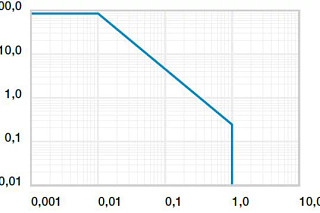
Diagram 01: Permissible pv values for iglidur® G1 plain bearing with a wall thickness of 1 mm dry operation against a steel shaft at +20°C, mounted in a steel housing.
X-axis = surface speed [m/s]
Y-axis = load [MPa]
The requirement profile is demanding: comprehensive further development of the successful all-round classic iglidur® G. This has been achieved above all in terms of moisture absorption, thermal specification and consistently improved wear resistance. Only in terms of impact, shock and edge loads was it not quite possible to match the robustness of iglidur® G.
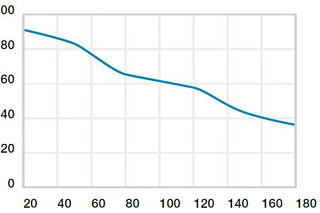
diagram. 02: maximum recommended surface pressure as a function of temperature (91 MPa at +20 °C)
X = temperature [°C]
Y = load [MPa]
Mechanical specification
The compressive strength of iglidur® G1 plain bearings decreases with increasing temperatures. diagram. 02 illustrates this relationship. At the long-term permissible application temperature of +180 °C, the permissible surface pressure is approximately 40 MPa. The maximum recommended surface pressure represents a mechanical material parameter. Conclusions about the tribology cannot be drawn from this.
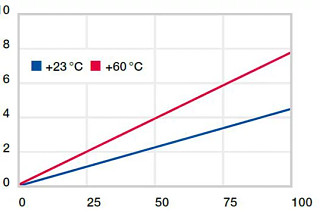
Diagram 03: Deformation under pressure and temperature
X = load [MPa]
Y = Deformation [%]
Diagram 03 shows the elastic deformation of iglidur® G1 at radial loads. The plastic deformation is minimal up to a pressure of approximately 100MPa. However, it is also dependent on the service time.
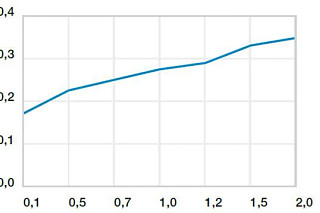
Diagram 04: Coefficient of friction as a function of the surface speed, p = 1MPa
X = surface speed [m/s]
Y = coefficient of friction μ
Friction and wear
The coefficient of friction μ of a plain bearing is influenced by surface speed and load, among other factors (diagram. 04 and 05).
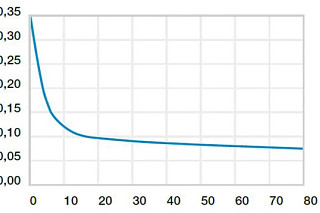
Diagram 05: Coefficient of friction as a function of the pressure, v = 0.01m/s
X = load [MPa]
Y = coefficient of friction μ
iglidur® G1
dry
Grease
oil
water
coefficient of friction µ
0,13 - 0,32
0,09
0,04
0,04
Table 04: coefficient of friction against steel
(Ra = 1 µm, 50 HRC)
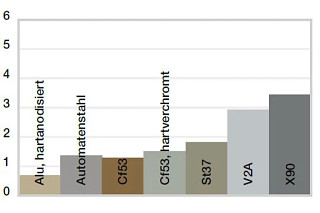
Diagram 06: Wear, rotating with different shaft materials, pressure, p = 1MPa, v = 0.3m/s
X = Shaft material
Y = wear [μm/km]
Shaft materials
Friction and wear are also highly dependent on the mating partner. Shafts that are too smooth increase both the coefficient of friction and the wear of the bearing. A ground surface with an average surface finish Ra = 0.8 μm is best suited for iglidur® G1. diagram. 06 shows an extension of the results of tests with different shaft materials that were carried out with plain bearings made from iglidur® G1. It can be seen that iglidur® G1 achieves good to very good wear results with all shaft materials. The stainless steel types are the most likely to fall slightly behind. diagram. 07 compares the rotating and swivelling wear. As with many iglidur® materials, the wear rate is better when swivelling.
Consulting
I look forward to answering your questions

Shipping and consultation
In person:
Monday to Friday from 7 am - 8 pm.
Saturdays from 8 am- 12 pm.
Online:
24h
WhatsApp-Service:
Montag – Freitag: 8 – 16 Uhr